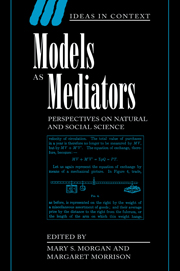Book contents
- Frontmatter
- Contents
- List of contributors
- Preface
- 1 Introduction
- 2 Models as mediating instruments
- 3 Models as autonomous agents
- 4 Built-in justification
- 5 The Ising model, computer simulation, and universal physics
- 6 Techniques of modelling and paper-tools in classical chemistry
- 7 The role of models in the application of scientific theories: epistemological implications
- 8 Knife-edge caricature modelling: the case of Marx's Reproduction Schema
- 9 Models and the limits of theory: quantum Hamiltonians and the BCS models of superconductivity
- 10 Past measurements and future prediction
- 11 Models and stories in hadron physics
- 12 Learning from models
- Index
7 - The role of models in the application of scientific theories: epistemological implications
Published online by Cambridge University Press: 10 March 2010
- Frontmatter
- Contents
- List of contributors
- Preface
- 1 Introduction
- 2 Models as mediating instruments
- 3 Models as autonomous agents
- 4 Built-in justification
- 5 The Ising model, computer simulation, and universal physics
- 6 Techniques of modelling and paper-tools in classical chemistry
- 7 The role of models in the application of scientific theories: epistemological implications
- 8 Knife-edge caricature modelling: the case of Marx's Reproduction Schema
- 9 Models and the limits of theory: quantum Hamiltonians and the BCS models of superconductivity
- 10 Past measurements and future prediction
- 11 Models and stories in hadron physics
- 12 Learning from models
- Index
Summary
INTRODUCTION
The theme of this book is reflected in the slogan ‘scientific models mediate between theory and the real world’. It is a theme with, at least, two aspects. One aspect is methodological. Model building is a pervasive feature of the methodology (or methodologies) employed by scientists to arrive at theoretical representations of real systems, and to manipulate reality. Many of the contributors to this book engage with the methodological issues, and they all agree that the activity of model building is central to scientific practice. The methodological implications of the slogan are clear: much of scientific practice, perhaps the totality of it, would be impossible without models.
Another aspect of the theme relates to issues such as the nature of explanation, the form of scientific confirmation and the debate over scientific realism. These are traditional philosophical issues, and in this paper I concentrate on one of them: models provide theories with genuine empirical content, by ‘filling in’ the abstract descriptions afforded by theory, hence making it possible to apply theories to natural phenomena. How do models perform this role? What are the consequences for the realism issue? The focus of this paper is on the implications of models for the epistemology of scientific knowledge.
- Type
- Chapter
- Information
- Models as MediatorsPerspectives on Natural and Social Science, pp. 168 - 196Publisher: Cambridge University PressPrint publication year: 1999
- 31
- Cited by



